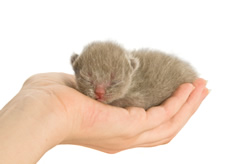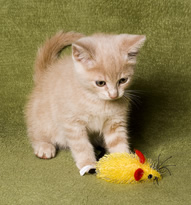|
Kitten Care, Year One in the Life of Your CatTo understand kitten care, one must first understand the nature of the beast - literally! A newborn kitten usually weighs about 3-4 ounces. This weight should double in the first nine days and continue to increase until the kitten is over 30 times its birth weight by the end of its first year. So you can see that year one is the most important year in a cat's life. Many cats do not fully mature for 3 or even 4 years, but regardless of how long full maturation takes, the first 12 months are incredibly important in development of the cat. Kittens are generally pretty high energy. As they begin to explore their new world, and gain coordination, they become very active and playful. Kitten care in the early days is mostly supervision. The kitten's primary activities are eating, sleeping and exploring/playing. Early days are spent acquiring new skills such as climbing, jumping, running, and even mock fighting. This continuous action requires vast amounts of energy supplied in the form of a high calorie intake. Quality Time with MomKittens live on their mother's milk for the first few weeks of their lives. During this time, they nurse eagerly and often. Mothers milk provides them with all the nutrients their bodies require. It is rich in protein and relatively low in carbohydrates and fats, compared to cow's milk. Unless there is some special medical problem, it’s best to let kittens live off their mother's milk exclusively for the first 4-6 weeks. This is the very best food for them. Kitten care givers need to be careful about giving anything other than mothers milk at this stage. In the first couple of days after the birth, the mother cat produces a special condensed kind of milk called colostrum. The colostrum contains passive antibodies, which provide the kittens with temporary immunity to certain diseases. So, it is very important to let kittens nurse naturally for the first two days if at all possible. Weaning Kittens
Weaning should be a very gradual part of kitten care. Take your time in allowing the kitten to slowly adjust to a new type of food. Usually, it is best for both mother and kittens if you start introducing food to the kittens at about four weeks of age. As the kittens consumption of food increases, demand for the mother's milk declines. She will naturally begin to produce less milk and eventually stop producing milk altogether. She will still provide motherly kitten care of her own for quite some time to come, but the feeding is now more your job than hers. Start the weaning process by giving the kittens a mixture of cat food (kitten or growth formula), mixed with water or cat milk replacement. According to most popular kitten care guidelines, if you use dry food, you should begin by mixing one part cat food and three parts of water. For weaning onto soft, canned food, begin by mixing one part cat food and two parts of water. Gradually decreasing the amount of water in the mixture should make the transition easier. By the time the kittens are ten weeks old, they should be able to be fed just the kitten food and mom can have a rest break. Continued Kitten Feeding
Kitten (or growth) formula cat foods are packed with protein as well as calories and ensure that kittens have a balanced diet suited for their unique needs. Buying a good quality kitten food will give kittens a good, healthy start in life and will also help protect them from disease. As long as you are buying good quality food, there is no need to add supplements such as vitamins or any other additives. Only if prescribed by your veterinarian should you add supplements to a kittens food. Adding unnecessary vitamins and minerals to an already balanced diet can actually be harmful. Kittens have tiny little stomachs, and good kitten care givers know that they need to eat several small meals in a day. It is best to free-feed kittens and let them eat what they can throughout the day. Keep in mind though, that if you are feeding canned cat food, don’t leave it sitting out for long, as it might get spoiled. Divide the daily amount into three or four portions (Small snack sized zippy bags work well for this) and feed at equal intervals throughout the day. In between meals, keep the food refrigerated and heat to room temperature before serving. If you reheat the food in the microwave, just give it a few seconds and then knead the zippy bag to mix the food and assess the warmth. Getting Started on the Right Paw
The first few months of a kittens life set the pace for the future, so to make sure you are not raising a finicky eater, try to introduce a variety of flavors while they are young. Always remember that when actually switching foods, you must do it very gradually, because a drastic change can upset their delicate system. Kittens should be kept on kitten food for the entire first year. After that, it is usually pretty easy to transition them to a food for adults. The manic growth and energy needs of kittenhood are mostly done now, and an adult food will keep your cat in top shape and not provide too many calories, which can result in and obese (and unhealthy) cat. Bonding With Your KittenKitten care research has demonstrated that not only the amount but also the quality of interactions a kitten has with humans during weeks two through seven of its life will play a large role in determining how responsive and friendly the adult cat will be with people. In kitten care studies, kittens between two and seven weeks old who were handled for 40 minutes a day came to a human more quickly and could be held and handled longer than kittens who were handled for just 15 minutes a day. Also, kittens that were handled by a variety of different people were noticeably more friendly to strangers than kittens who were only handled by one person. Socializing and petting are very important in these early times, so shower all the love you want on kitty – it’s good for him!
What to name kitty?Wondering what to name your cat? Visit
Cat Names Place
for male and female cat names, cute cat names, funny cat names, popular cat names and much more!
To make sure your home is kitten friendly and has no toxic plants, please also view my page on Cat Health . From there, you can access extensive lists of common Cat Safe Plants and Cat Toxic Plants and foods. I will be adding more kitten care tips and articles as time permits, and in the meantime, if you have any thoughts or suggestions, please don’t hesitate to Contact Me . I love hearing from other cat lovers like myself. Until next time, my best to you and your feline friends.
Back from Kitten Care to Home Page
|








